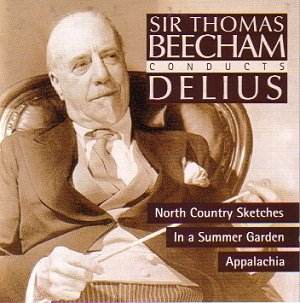This
is a companion issue to the two discs of Sir Thomas Beecham conducting
Delius choral and orchestral works I reviewed recently. Like them
the repertoire consists largely of works he had recorded once
before in the 1930s and which are currently available on Naxos
Historical.
Delius
was born in Bradford, and the very particular topography of the
Yorkshire moors is what lies behind the North Country Sketches.
Of the four pieces, three evoke the seasons: only summer is absent,
with, in its place, a lively movement entitled simply Dance.
These pieces were new to me, and after several hearings I find
them elusive and unwilling to give up their secrets. This makes
me inclined to agree with Beecham’s statement in his biography
of the composer – and which is quoted in the booklet note – that
"There is very little of human contact here". The pieces
conjure up the natural world with the composer’s habitual skill
and invention, but perhaps with a certain aloof coldness.
In
a Summer Garden is better known and, I think, easier on the
ear on a first acquaintance. The scene is painted with almost
uncanny skill, though the composer has no need to rely on onomatopoeic
devices such as bees humming and birds singing when with purely
musical devices, in particular his most sensitive and inventive
way with woodwind solo writing, he recreates so exactly the hot,
languid stillness of the scene. Another quote from Sir Thomas
helps to explain why the piece is so successful: "The mood
has an unimpeachable unity". This might give the impression
of monotony, but in fact this is not the case. There is considerable
variety of musical material, even of tempo, but never for a moment
do we feel that the tranquillity of the garden has been disturbed.
Appalachia
is a large-scale set of variations on "an old Negro slave
song" though the origin of the theme itself is unclear. There
is a lengthy introduction of great beauty and instrumental ingenuity
before the first statement of the theme which is given to the
cor anglais. The theme is instantly recognisable and rarely far
away thereafter. Towards the end of Variation 6 a wordless chorus
is heard, and as the work progresses their contribution becomes
more important. In the final variation a baritone soloist joins
the chorus to sing the farewell song of a slave to his loved ones
before he is transported downriver to a new master. Appalachia
is surely amongst the most affecting of all Delius’ works. There
is a directness and simplicity of utterance which he didn’t always
achieve in other pieces, though some have found the omnipresence
of the theme rather tiring.
In
line with the other discs in this series the performances are
definitive and first class in every way. In a Summer Garden
is quite extraordinarily concentrated and unified in approach,
and the orchestral playing, it need hardly be said, is of the
very finest quality with, in particular, some ravishing woodwind
playing in Appalachia. All the recordings are in mono only,
but the sound is very fine for the period, and even that of North
Country Sketches, taken from 78s, can be listened to with
pleasure and without having to make allowances for the sound.
The
presentation is similar to the other discs too, with a lengthy
article about Sir Thomas by Graham Melville-Mason, paying particular
attention to his relationship with these particular pieces and
including several quotes from him about the works themselves.
Curiously the soloist and chorus in Appalachia are not
named, and the short text they sing at the end of the work is
not given, which is a pity.
This
disc is an obvious recommendation for Delius enthusiasts, even
those who already have the excellent discs by Handley, Barbirolli
and others, and in particular the outstanding (and very cheap)
reading of Appalachia by Richard Hickox, coupled with Sea
Drift, originally issued on Argo in 1981 and currently available
on Australian Eloquence.
William
Hedley
see
also reviews by Stephen
Lloyd and Rob
Barnett
